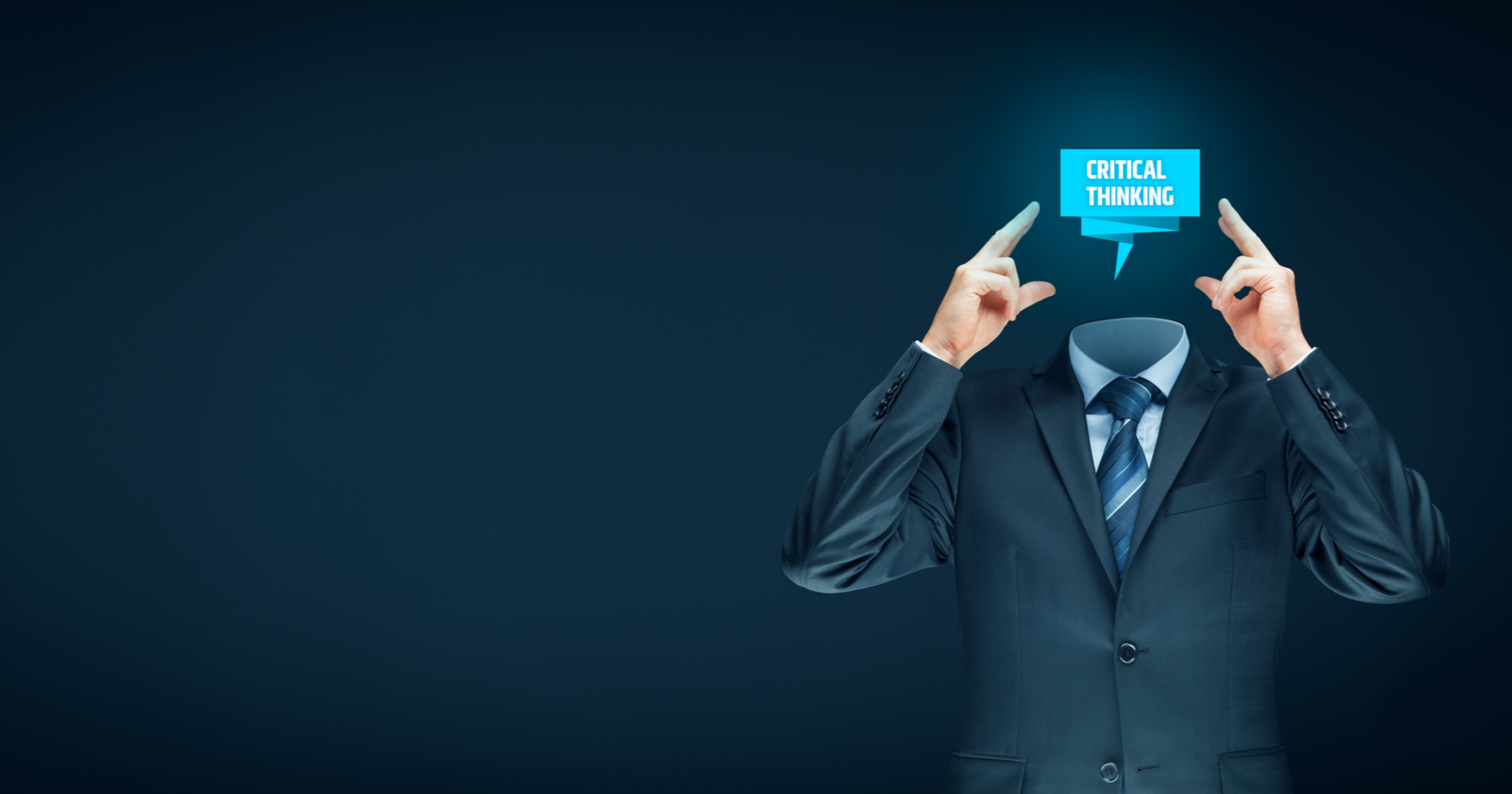As someone who’s worked with dozens of super-smart employees in my capacity as an agency owner, I’ve seen that in some cases, these super-smart people can’t think critically. They can’t solve real-world problems.
They can throw out brilliant ideas, but they can’t execute them.
A professor friend of mine had the same problem with many of his students. He said that they were well-read, did their homework, did well on the tests, but had a lot of trouble writing essays or having discussions in class.
Now it’s obvious that no matter how good your critical thinking skills may be, you might not always immediately use them in certain situations, especially ones that involve intense emotions such as fear.
I used to have difficulty thinking clearly when I was just starting out in my career and I would be put on the spot in a meeting full of people with much more experience. I’d feel panic and my mind would go blank.
Occasionally this still happens, but I try and remember to slow down and use logic.
I think that the best way I improved my critical thinking skills was by training as a programmer.
One of our first exercises was to program an elevator. It sounded simple until you realized all the ways the program could fail. (Mine shot out of the building because it never stopped going up.)
You had to account for every possible way that a user could screw something up and make something bad happen. It was a great lesson that really changed the way I think about problems.
Analyzing a Situation
When presented with loads of information, you need to be able to break it down into its parts. You need to organize it and see the patterns and trends involved.
It’s difficult to make a good decision when information is not properly organized.

In SEO, performing analysis is part of our job every single day.
- We are called upon to determine “what’s going on!” with a site, whether rankings fall or traffic falls or the client just thinks something isn’t right.
- We do keyword research and gather 10,000 lines of data that has to be turned into a list of the best keywords to use for paid media and in our content. We break down the link profiles of competitors.
- We examine top-performing content.
All of this is done with the goal of figuring out what needs to be done.
With so many great tools available to us in this industry, there is surely a way for every SEO to gain practical knowledge of how to get better at analysis.
Practice makes perfect in situations like this, so dig into a site, see what’s there, figure out what’s working and what isn’t and compare it to another site.
Anything you can do that organizes data will be helpful. If you ever have the opportunity, I highly recommend learning a programming language. Or repair your broken dishwasher yourself. Or figure out how to make a recipe vegan and gluten-free.
Basically, find a potential or real problem and discover how to fix it.
Communicating with Others
If you need information from someone, you need to be able to ask for it and understand what you get back.
You need to be able to give information, too.
Easier said than done in many cases.

Let’s say you’re doing an SEO audit for a client. The client doesn’t understand SEO very well and has a lot of questions about the recommendations. You get on the phone to talk.
It’s now your job to make sure this client understands what’s going on. There needs to be communication between collaborators, both internal and external.
I have one client where I have to communicate with my client representative, a content lead, a writer, and 5 other link builders who are all doing various forms of link building. We can’t afford to have communication breakdowns.
You can’t really get better at communicating effectively unless you do it.
Writing articles is one way to improve. Speaking at a meeting or conference certainly helps.
Someone once told me that creating and presenting a PowerPoint deck is a great exercise in communication because you want the slides to look good but you don’t want to have people sitting there reading bullet points, so you need to be able to keep people’s attention and get your points across.
Being Creative & ‘Thinking Outside the Box’
I always immediately see the reasons something is impossible and the ways it can go wrong.
That made me really good when I was testing websites, but it does mean that I’m not always willing to listen to new ideas. I really have to work on this one.
I greatly admire creative people. You can get away with not being overly creative in our industry though, but it does limit you I think.

We have access to an overwhelming amount of data. Using that data is where creative thinking really comes into play.
We need to be able to come up with something new to try to make our site rank better, for example. We need to have content ideas that really work. We need to be able to take risks much of the time.
There are two things that I do to help me think more creatively.
- I go to an amazing little local store where they have things like thousands of mismatched fabric squares, old vinyl records, mannequin heads, vintage postcards, books, frames, etc. Every time I go into this store, I feel like my mind expands because I start thinking of how I could use something.
- I keep a list that I update frequently. It’s called “things I won’t do.” Ridiculous but a lot of fun for me. Here’s a cool list of 7 things you can do to improve your creativity.
Keeping Your Options Open
It’s always good to be flexible and have several ideas and plans in case “the one” doesn’t work out.
When you’re making a decision, you need to keep your options open as long as possible so that you don’t cut off potentially good ideas because you’ve made your mind up too soon.

If you’re working on a 6-month plan for a client’s link campaign, you will have loads of data to use and an enormous amount of options to choose from based on the past performance of the site, the competitiveness of the industry, budget, client goals, etc.
Let’s say you and the client decide on a plan but 3 months in, you’re falling far short of your goals and the client desperately needs more business.
You could decide to use paid media to help bring the numbers up, even if that’s a temporary thing. Or you could invest more in social media promotions.
You simply need to have options for when something doesn’t go the way you think it will.
Without being creative and thinking outside the box, it’s hard to keep your options open so those two skills go hand in hand.
Sometimes thinking in discrete terms about everything isn’t helpful. This applies to so many aspects of life, too.
Saying “try something new” sounds trite but it’s really is important.
Solving Problems
It’s difficult to go through daily life without encountering problems that need to be solved.
Our dishwashers break down, our babysitters can’t make it, our parents get sick.

Solving problems is what SEO professionals do all day, every day.
With few exceptions, most sites that we work on aren’t 100% steady or ever-increasing their traffic, rankings, and conversions.
All it takes is a new competitor or algorithmic update to launch us back into problem-solving mode.
If you do SEO, surely you get plenty of practice solving problems every day. When you aren’t encountering a problem, you can always try and improve something.
Go find the pages that get the least amount of traffic and figure out why that is. See if you can improve the load time or bounce rate.
Everything can always handle some improvement.
Want to read up on more skills you need to be a great SEO? Ryan Jones has you covered with some great tips!
More Resources:





![AI Overviews: We Reverse-Engineered Them So You Don't Have To [+ What You Need To Do Next]](https://www.searchenginejournal.com/wp-content/uploads/2025/04/sidebar1x-455.png)